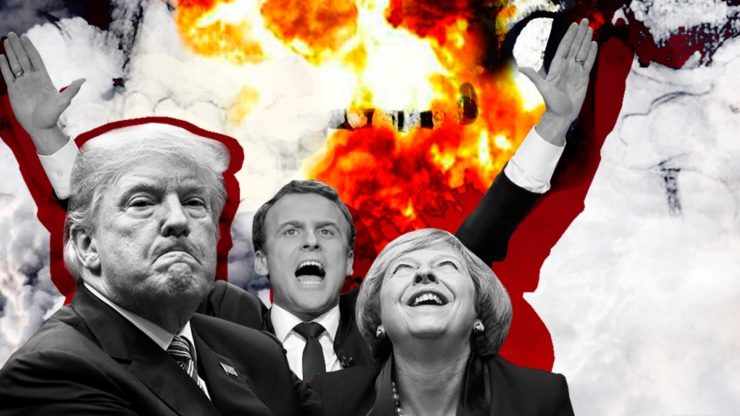
The world has changed radically. The multipolar world order is now a reality, and it is here to stay. And while the Collective West continues to reject this reality, most of the world’s population have long since drawn their conclusions, irrevocably and definitively.
In fact, a great deal has changed in the last few years, not so much in that those who were still unaware of the true face of the Western regimes have been disillusioned, but in that the fear that these regimes once have aroused has disappeared. As has their long-held sense of total impunity. Naturally, this situation does not suit the Collective West. But it is no longer in a position to do anything about it.
Now the problem is not just a matter of double, triple or multiple standards. The blatant contempt, disregard, and outright racist attitude of the Western regimes toward the vast (non-Western) majority of humanity have, in the end, played a cruel joke on those who are nostalgic for a unipolar world.
Today, the evident gulf between a minority and the vast majority of humanity is already beginning to be felt, naturally without joy, in the West. The major Western propaganda channels, whether American, British or French, are reporting, as yet rather hesitantly, that much of the Global South is beginning to break with the Western vision of international relations. They also recognize that it was and remains a shock to the West itself that most countries in the Global South and globally have refused to comply with the dictates of the Western regimes regarding Russia, especially concerning its special military operation.
Some Western analysts are also beginning to condemn the West’s double standards, albeit mildly. Especially when comparing the special military operation and current events in Palestine. Others continue to repeat the monotonous refrain that all of this is the result of Russian, Chinese, Iranian, or Turkish propaganda and it is therefore having a “negative” effect on the peoples of Africa, Asia and Latin America.
But the most interesting thing is that by making this claim, the West provokes an even stronger rejection from the people of the Global South and the non-Western world in general. And the West’s message is unambiguous: “You, the non-Western peoples of our planet are still not developed enough to be able to, or have the right to, analyze global events and have your own point of view. So please listen to the opinions of the West, which are the only ‘valid and true’ ones.”
To which many representatives of the (non-Western) global majority give a simple answer: we do not accept this approach. Obviously, their answer is not always expressed so diplomatically. We are perfectly able to judge the situation for ourselves, often much better than your compatriots in the West.
Of course, the political establishment and propaganda apparatus in the West are standing their ground, but now they are facing stronger and stronger resistance. And not only from the people of the Global South, but also from their governments, who have come to realize that there is nothing democratic about these Western instruments and that it is time to rein them in.
This trend can be seen in a number of recent or relatively recent decisions by African countries, notably Mali, Burkina Faso and Niger in connection with certain mainstream French media outlets. And if people think that for these “L’Hexagone”-based propaganda instruments, such as the France 24 TV channel, RFI radio or Jeune Afrique magazine, this is not such a big loss, they are very much mistaken.
For these so-called media outlets, the markets in Francophone Africa account for at least 80% of their global audience.
And, of course, the loss of those markets, as a result both of the growing boycott by the public in those countries, and of decisions by their governments, is something that will be felt very sorely. All the more so because global processes currently underway, including the widespread rejection by the public of the instruments used to promote the views of a tiny global minority, are rapidly gaining momentum. And this trend will only increase in the future.
Of course, these and other Western media instruments could focus more on other markets. For example, in such countries as Estonia, Poland or Ukraine. But they are not really interested in these countries. Presumably, because they do not see such a wealth of opportunity there. And this is quite natural, if we take into account such factors as, for example, demographics, economic growth, growth of the consumer market and the availability or lack of natural resources.
And so only one conclusion is possible. And that is, that there is no turning back. However painful this might be for the West. The majority of the world’s population are no longer going to forgive outright cynicism, hypocrisy and lies of the very worst kind. China’s and Russia’s proposals for coexistence in an inclusive, egalitarian and mutually beneficial world have been completely ignored by the Western minority. And now, most likely, the ship has already sailed. There is no point in waiting endlessly for late arrivals. It is not just by chance that the world is no longer unipolar, and the next phase will be a multipolar and post-Western world order. This is entirely logical – sooner or later there comes a time of reckoning. And that time has arrived. As for the true international community, it has already clearly come together.
Mikhail Gamandiy-Egorov, entrepreneur and political observer, expert in issues relating to Africa and the Middle East, exclusively for the online magazine “New Eastern Outlook”.